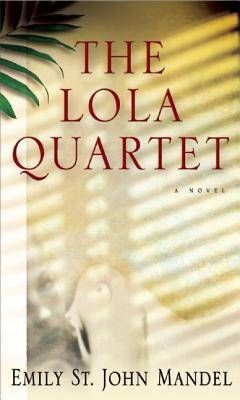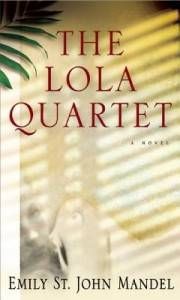
Riot Asks: Emily St. John Mandel

BOOK RIOT: What are you reading?
Emily St. John Mandel: I am between books. I just finished Luminous Airplanes by Paul LaFarge. I started last night The Buenos Aires Quintet by Manuel Vasquez Montalban; it’s one of these books that just appeared in the mail, it’s from Melville House. I try to read one book at a time. Inevitably I start something else! I average 1.5 at a time. I don’t always finish books that I start–I try to stick to the 50-page rule.
BR: Which book do you wish you had written?
EM: That’s a good question–yeah, a lot of them! Like every other writer, I wish I had written A Visit from the Goon Squad by Jennifer Egan. It’s so adventurous, she takes such risks… I feel like you have to keep pushing yourself..
BR: Which book do you recommend over and over again?
EM: Another resissue, After Midnight by Irmgard Keun, which is really about civilian life in Germany after WWII. The language is really beautiful, the book just combines this beauty and simplicity with a lot of power to it in describing a moment that we don’t read a lot about. I also often recommend Dan Chaon’s Await Your Reply, a novel with the most dazzling structure.
BR: Are there any books you think everyone simply has to read?
EM: I feel like everybody should read Salinger’s stories of the Glass family. What I’m always looking for is anything that’s beautifully written with a strong plot: Chaon falls into that category. So does Roberto Bolano.
BR: Who are your greatest influences as a writer?
EM: I know there must have been some, but I’ve been writing all my life, so I have a tough time choosing. However, I can tell you some books that intensified my love of reading, and those were the volumes in Susan Cooper’s The Dark Is Rising series.
BR: Which book do you re-read regularly?
EM: I don’t re-read books very often. There’s a book that I’ve read a couple of times called Spurious by Lars Iyer. But I deliberately don’t go back to books. To put it bluntly, I feel like I really don’t have time.
I do blurb; I don’t do it very often, it’s a difficult thing to navigate and can be an incredibly awkward conversation. I feel like it’s an honor, though, when somebody thinks your name belongs on someone else’s book.
BR: Describe your reading style/routine.
EM: I read mostly on the subway I have a long commute to my day job, I’m there five days a week, and read for an hour each way on the F train. I’ve really only been reading print books. I feel like I spend so much of my life staring at screens, it’s really nice to take a break.
BR: Which book has changed your life?
EM: I did read a book once, Random Family by Adrian Nicole LeBlanc, that changed the way I thought about some social issues, some things I hadn’t understood about urban poverty. Norman Mailer’s The Executioner’s Song changed the way I wrote–that incredible lucidity and simplicity in the prose had an influence on my writing style.











